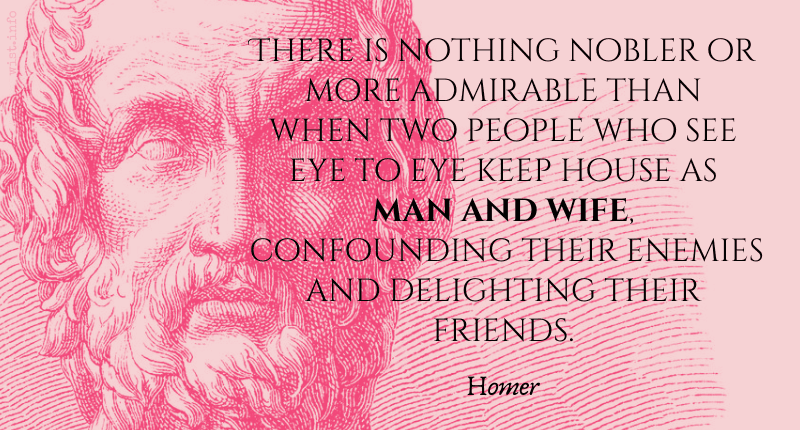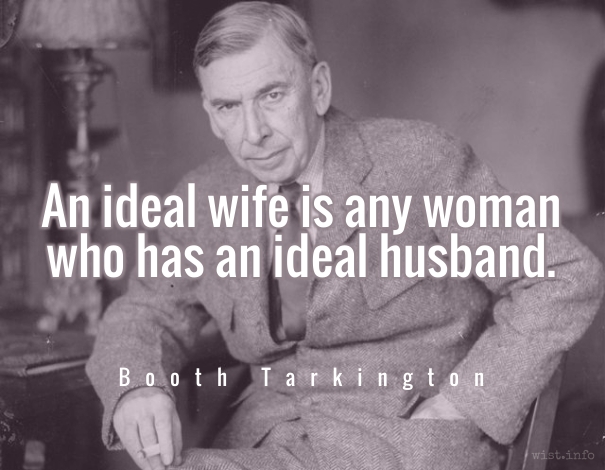After a hard night of it two old friends fell into a sleepy conversation in the steam-room of a Turkish bath.
“My wife loves me so much,” said one, “that she’ll believe me when I tell her I was kept downtown all night by business.”
“My wife loves me so much,” said the other, “that I won’t be afraid to tell her the truth.”H. L. Mencken (1880-1956) American writer and journalist [Henry Lewis Mencken]
A Little Book in C Major, ch. 1, § 10 (1916)
(Source)
Quotations about:
wife
Note not all quotations have been tagged, so Search may find additional quotes on this topic.
You lead such matching, equal lives —
the worst of husband, worst of wives —
that it’s a mystery to me
why you aren’t suited perfectly.[Cum sitis similes paresque vita,
Uxor pessima, pessimus maritus,
Miror, non bene convenire vobis.]Martial (AD c.39-c.103) Spanish Roman poet, satirist, epigrammatist [Marcus Valerius Martialis]
Epigrams [Epigrammata], Book 8, epigram 35 (8.35) (AD 94) [tr. McLean (2014)]
(Source)
(Source (Latin)). Alternate translations:
When as you are so like in life,
A wicked husband, wicked wife,
I wonder you should live in strife.
[16th C Manuscript]
Sith that you both are like in life,
(a naughty man, an wicked wife:)
I muse ye live not voyd of strife.
[tr. Kendall (1577), "To a Married Couple, that could not Agree"]
Why doe your wife and you so ill agree,
Since you in manners so well matched be?
Thou brazen-fac'd, she impudently bould,
Thou still dost brawle, she evermoure doth scould.
Thou seldome sober art, she often drunk,
Thou a whore hunting knave, she a knowne Punck.
Both of you filch, both seare, and damme, and lie,
And both take pawnes, and Iewish usurie.
Not manners like make man and wife agree,
Their manners must both like and vertuous bee.
[tr. Davison (1602)]
Both man and wife as bad as bad can be:
I wonder they no better should agree.
[tr. Hay (1755)]
O peerless pair, so like in life,
O vilest husband, vilest wife!
No wonder ye agree -- in strife.
[tr. Elphinston (1782), "To a Married Pair," Book 6, Part 2, ep. 46]
Alike in temper and in life,
A drunken husband, sottish wife,
She a scold, a bully he, --
The devil's in 't they don't agree.
[tr. Hoadley (fl. 18th C), §243]
Since you are so well matched, and so much alike in your lives, a very bad wife, and a very bad husband, I wonder that you do not agree.
[tr. Bohn's Classical (1859), "To a Bad Couple"]
You are so like, so equal, in your life,
A husband of the worst, a worthless wife,
I really wonder why you don't agree.
[ed. Harbottle (1897)]
Seeing that you are like one another, and a pair in your habits, vilest of wives, vilest of husbands, I wonder you don't agree!
[tr. Ker (1919)]
It is very strange, as it seems to me,
That you and your wife should not agree,
Since each is as vile as vile can be.
[tr. Pott & Wright (1921), "Depth to Depth"]
Bad wife, bad husband, like as pea to pea,
I really wonder that you can't agree.
[tr. Francis & Tatum (1924), ep. 412]
Since you're alike and lead a matching life,
Horrible husband and ill-natured wife,
Why all the discord and domestic strife?
[tr. Michie (1972)]
Since the two of you are alike and equal in your way of life, a rotten wife and a rotten husband, I am surprised you don't suit one another.
[tr. Shackleton Bailey (1993)]
You're an awful couple,
but birds of a feather --
It's weird you don't
Get along together.
[tr. Ericsson (1995)]
How can your squabbling be so curst?
Of natural pairings yours is first --
Worst husband with a wife that's worst.
[tr. Wills (2007)]
Since you two are similar and equal in your way of life, being an awful wife and an awful husband, I’m surprised you don’t get along well with each other.
[tr. aleator classicus (2012)]
Since you both share the same approach to life
(a lousy husband and a lousy wife),
I am bewildered it
is not a better fit.
[tr. Juster (2016)]
Do not be deceived by appearances. The virtue of a man is not to be measured by what he does while his wife is watching.
H. L. Mencken (1880-1956) American writer and journalist [Henry Lewis Mencken]
A Little Book in C Major, ch. 1, § 19 (1916)
(Source)
Only choose in marriage a woman whom you would choose as a friend if she were a man.
[Il faut ne choisir pour épouse que la femme qu’on choisirait pour ami, si elle était homme.]
Joseph Joubert (1754-1824) French moralist, philosopher, essayist, poet
Pensées [Thoughts], ch. 8 “De la Famille et de la Société, etc. [On the Family and Society],” ¶ 9 (1850 ed.) [tr. Collins (1928), ch. 7]
(Source)
(Source (French)). Alternate translations:
We should choose for a wife only the woman we should choose for a friend, were were she a man.
[tr. Calvert (1866), ch. 8]
One ought not to choose for a wife a woman whom one would not choose for a friend, were she a man.
[tr. Attwell (1896), ¶ 98]
One should only choose for a wife a woman whom one would choose for a friend, were she a man.
[tr. Lyttelton (1899), ch. 7, ¶ 4]
Do not choose for your wife any woman you would not choose as your friend if she were a man.
[tr. Auster (1983)], 1801]
Man’s best possession is a sympathetic wife.
[ἄριστον ἀνδρὶ κτῆμα συμπαθὴς γυνή]
Euripides (485?-406? BC) Greek tragic dramatist
Antigone [Ἀντιγόνη], frag. 164 (TGF) (c. 420-406 BC)
(Source)
(Source (Greek)). Alternate translation:
The best thing for a husband is an understanding wife.
[Source]
Of all treasures this is best: to find a noble-minded wife.
[τῶν γὰρ πλούτων ὅδ’ ἄριστος
γενναῖον λέχος εὑρεῖν.]Euripides (485?-406? BC) Greek tragic dramatist
Andromeda [Ἀνδρομέδα], Frag. 137 (TGF) (412 BC)
(Source)
(Source (Greek)). Alternate translations:
The best of treasures is a virtuous Wife.
[tr. Wodhull (1809)]
Best of all riches is to find a noble spouse.
[@sentantiq (2014)]
Themison has no wife — and never missed her.
Fabullus, you ask why? He has a sister.[Quare non habeat, Fabulle, quaeris
Uxorem Themison? Habet sororem.]Martial (AD c.39-c.103) Spanish Roman poet, satirist, epigrammatist [Marcus Valerius Martialis]
Epigrams [Epigrammata], Book 12, epigram 20 (12.20) (AD 101) [tr. McLean (2014)]
(Source)
"To Fabullus." Both Ker and Shackleton Bailey explicitly note that habet does, in fact, have a secondary meaning of "has sex with." (Source (Latin)). Alternate translations:
You lately were inquiring, why Silvester
Has not yet got a wife? -- He has a sister.
[tr. Hay (1755)]
Why Themison has not a wife, nor e'er missed her,
Fabullus, you ask? Honest Them has a sister.
[tr. Elphinston (1782)]
Do you ask, Fabullus, why Themison has not a wife? He has a sister.
[tr. Bohn's Classical (1859)]
Do you ask, Fabullus, why Themison has not got a wife? He has a sister.
[tr. Ker (1919)]
You wonder how he lives unmarried? Cease
To marvel, for his Reverence has a niece.
[tr. Pott & Wright (1921), "The Alternative"]
Do you ask, dear reader, why Themison
Has no wife? Why, hell!
The reason's rather obvious:
His sister does as well!
[tr. Marcellino (1968)]
Brother never
had a wife
he had sister
all his life.
[tr. Goertz (1971)]
Fabullus, you ask why Themison doesn't have a wife. He has a sister.
[tr. Shackleton Bailey (1993)]
Why no wife? He quickly concedes
His sister takes care of all his needs.
[tr. Ericsson (1995)]
Of course we know he'll never wed.
What? Put his sister out of bed?
[tr. Wills (2007)]
He doesn't need a wife
His sister is enough
[tr. Kennelly (2008), "Enough"]
You want to know, Fabullus, why Themison doesn’t have a wife. He has a sister.
[tr. @aleatorclassicus (2010)]
Fabullus, do you want to know why Mr.
Themison has no wife? He has a sister.
[tr. Powell]
And so I say that for brutality and infamy there is no one to equal a woman who can contemplate such deeds. Who else could conceive so hideous a crime as her deliberate butchery of her husband and her lord?
[ὣς οὐκ αἰνότερον καὶ κύντερον ἄλλο γυναικός,
ἥ τις δὴ τοιαῦτα μετὰ φρεσὶν ἔργα βάληται:
οἷον δὴ καὶ κείνη ἐμήσατο ἔργον ἀεικές,
κουριδίῳ τεύξασα πόσει φόνον.]Homer (fl. 7th-8th C. BC) Greek author
The Odyssey [Ὀδύσσεια], Book 11, l. 427ff (11.427) [Agamemnon] (c. 700 BC) [tr. Rieu (1946)]
(Source)
Agamemnon, in the Underworld, telling Odysseus of his betrayal by Clytemnestra. Original Greek. Alternate translations:
Nothing so heap’d is with impieties,
As such a woman that would kill her spouse
That married her a maid.
[tr. Chapman (1616)]
Nothing so cruel as a woman yet
Did nature e’er produce; a thought so ill
In any other breast did never sit,
As her own loving husband’s blood to spill.
[tr. Hobbes (1675), l. 409ff]
O woman, woman, when to ill thy mind
Is bent, all hell contains no fouler fiend:
And such was mine! who basely plunged her sword
Through the fond bosom where she reign'd adored!
[tr. Pope (1725)]
So that the thing breathes not, ruthless and fell
As woman once resolv’d on such a deed
Detestable, as my base wife contrived,
The murther of the husband of her youth.
[tr. Cowper (1792), l. 519ff]
Since nought exists more horrible and bold
Than evil in the breast of womankind,
When she to her own lust herself hath sold,
Even as this fell monster in her mind
Against the husband of her youth designed
Black murder.
[tr. Worsley (1861), st. 60]
Thus there is nought more horrible and shameless,
Than woman, who such deeds as these could think on!
Like as she compassed this unseemly deed --
Blood -- murder 'gainst the husband of her youth!
[tr. Bigge-Wither (1869)]
Nought can more fearful be --
Nought more revolting in all shamelessness
Than Woman of this stamp, who to her heart
Such schemes could lay: For what a loathsome act
Was that which she design'd by bloody death
The husband to destroy, whom in her youth
She had in lawful wedlock made her vow!
[tr. Musgrave (1869), l. 659ff]
So surely is there nought more terrible and shameless than a woman who imagines such evil in her heart, even as she too planned a foul deed, fashioning death for her wedded lord.
[tr. Butcher/Lang (1879)]
Nought more shameless or more fearful than a woman may ye find
When she at last conceiveth such deeds within her mind.
E'en such a deed so unseemly as she imagined for me,
To murder her wedded husband!
[tr. Morris (1887), l. 427ff]
Ah, what can be more horrible and brutish than a woman when she admits into her thoughts such deeds as these! And what a shameless deed she plotted to bring about the murder of the husband of her youth!
[tr. Palmer (1891)]
For there is nothing in this world so cruel and so shameless as a woman when she has fallen into such guilt as hers was. Fancy murdering her own husband!
[tr. Butler (1898)]
So true is it that there is nothing more dread or more shameless than a woman who puts into her heart such deeds, even as she too devised a monstrous thing, contriving death for her wedded husband.
[tr. Murray (1919)]
I tell you, there is nought more awful and inhuman than a woman who can fondle in her heart crimes so foul as this conception of my wife's to murder the husband of her youth.
[tr. Lawrence (1932)]
So there is nothing more deadly or more vile than a woman
who stores her mind with acts that are of such sort, as this one
did when she thought of this act of dishonor, and plotted
the murder of her lawful husband.
[tr. Lattimore (1965)]
So,
there’s nothing more deadly, bestial than a woman
set on works like these -- what a monstrous thing
she plotted, slaughtered her own lawful husband!
[tr. Fagles (1996)]
Nothing
Is more grim or more shameless than a woman
Who sets her mind on such an unspeakable act
As killing her own husband.
[tr. Lombardo (2000), l. 443ff]
So there is nothing at all more dreadful or vile than a woman who in the thought of her heart meditates this kind of misdoing like that woman who craftily plotted a deed so indecent causing the death of the husband she wedded.
[tr. Merrill (2002)]
There is nothing more terrible, nor anything more shameless, than a woman who can plan deeds like this in her heart, deeds like this ugly crime that Clytemnestra plotted: the murder of her lawfully wedded husband.
[tr. Verity (2016)]
There's nothing more frightful or shameless than a woman who conceives the idea of such misdeeds in her heart, like the horrifying act that this woman planned, contriving her own wedded husband's murder.
[tr. Green (2018)]
The truth is, there’s nothing more disgusting,
more disgraceful, than a woman whose heart
is set on deeds like this -- the way she planned
the shameless act, to arrange the murder
of the man she married.
[tr. Johnston (2019), l. 539ff]
And in return may the gods grant you your heart’s desire; may they give you a husband and a home, and the harmony that is so much to be desired, since there is nothing nobler or more admirable than when two people who see eye to eye keep house as man and wife, confounding their enemies and delighting their friends, as they themselves know better than anyone.
[Σοὶ δὲ θεοὶ τόσα δοῖεν, ὅσα φρεσὶ σῇσι μενοινᾷς,
ἄνδρα τε καὶ οἶκον, καὶ ὁμοφροσύνην ὀπάσειαν
ἐσθλήν· οὐ μὲν γὰρ τοῦ γε κρεῖσσον καὶ ἄρειον,
ἢ ὅθ’ ὁμοφρονέοντε νοήμασιν οἶκον ἔχητον
ἀνὴρ ἠδὲ γυνή· πόλλ’ ἄλγεα δυσμενέεσσι,
χάρματα δ’ εὐμενέτῃσι· μάλιστα δέ τ’ ἔκλυον αὐτοί.]Homer (fl. 7th-8th C. BC) Greek author
The Odyssey [Ὀδύσσεια], Book 6, l. 180ff (6.180) [Odysseus to Nausicaa] (c. 700 BC) [tr. Rieu (1946)]
(Source)
Original Greek. The passage uses variations on the Greek term ὁμοφροσύνην (homophrosynê, likemindedness). Alternate translations:
God give you, in requital, all th’ amends
Your heart can wish, a husband, family,
And good agreement. Nought beneath the sky
More sweet, more worthy is, than firm consent
Of man and wife in household government.
It joys their wishers-well, their enemies wounds,
But to themselves the special good redounds.
[tr. Chapman (1616)]
And may Jove you with all you wish for bless,
A husband and a house, and concord good;
For man and wife to live in unity
Is the great’st blessing can be understood:
It joys your friend, and grieves your enemy.
[tr. Hobbes (1675), l. 172ff]
So may the gods, who heaven and earth control,
Crown the chaste wishes of thy virtuous soul,
On thy soft hours their choicest blessings shed;
Blest with a husband be thy bridal bed;
Blest be thy husband with a blooming race,
And lasting union crown your blissful days.
The gods, when they supremely bless, bestow
Firm union on their favourites below;
Then envy grieves, with inly-pining hate;
The good exult, and heaven is in our state.
[tr. Pope (1725)]
And may the Gods thy largest wishes grant,
House, husband, concord! for of all the gifts
Of heav’n, more precious none I deem, than peace
’Twixt wedded pair, and union undissolved;
Envy torments their enemies, but joy
Fills ev’ry virtuous breast, and most their own.
[tr. Cowper (1792), l. 226ff]
And unto thee the heavenly gods make flow
Whate'er of happiness thy mind forecast,
Husband and home and spirit-union fast!
Since nought is lovelier on the earth than this,
When in the house one-minded to the last
Dwell man and wife -- a pain to foes, I wis,
And joy ot friends -- but most themselves know their own bliss.
[tr. Worsley (1861), st. 24]
But, to thyself may the immortal gods
The largest wishes of thy heart fulfil!
A consort, home, and perfect peace therein
May they bestow! For nought in nobleness,
Nought in all virtue can the good surpass
Of perfect concord in the married pair
Whose blended counsels rightly rule their home:
Their foes with pain behold it! but, to all
Who wish them well, it is a joyful sight!
Joy, which themselves, 'bove all, can well discern!" [tr. Musgrave (1869), ll. 277ff]
To thee the gods give all thy heart's desire!
A husband and home and loving hearts beside --
That best of gifts: for nought is better and braver
Than this, when man and wife unanimous
Hold their own home -- a sorrow they to foes --
A joy to friends -- and chiefest to themselves!
[tr. Bigge-Wither (1869)]
And may the gods grant thee all thy heart’s desire: a husband and a home, and a mind at one with his may they give -- a good gift, for there is nothing mightier and nobler than when man and wife are of one heart and mind in a house, a grief to their foes, and to their friends great joy, but their own hearts know it best.
[tr. Butcher/Lang (1879)]
And so may the high Gods give thee whatso thine heart holds dear,
A husband and a homestead, and concord whole and sound.
For nothing sure more goodly or better may be found
Than man and woman holding one house with one goodwill.
Thuis many a grief are they giving to those that wish them ill,
But great joy to their well-willers; and they wot it best of all.
[tr. Morris (1887)]
And may the gods grant all that in your thoughts you long for: husband and home and true accord may they bestow; for a better and higher gift than this there cannot be, when with accordant aims man and wife have a home. Great grief is it to foes and joy to friends; but they themselves best know its meaning.
[tr. Palmer (1891)]
May heaven grant you in all things your heart's desire -- husband, house, and a happy, peaceful home; for there is nothing better in this world than that man and wife should be of one mind in a house. It discomfits their enemies, makes the hearts of their friends glad, and they themselves know more about it than any one.
[tr. Butler (1898)]
And for thyself, may the gods grant thee all that thy heart desires; a husband and a home may they grant thee, and oneness of heart -- a goodly gift. For nothing is greater or better than this, when man and wife dwell in a home in one accord, a great grief to their foes and a joy to their friends; but they know it best themselves.
[tr. Murray (1919)]
And to you may the Gods requite all your heart's desire; husband, house, and especially ingenious accord within that house: for there is nothing so good and lovely as when man and wife in their home dwell together in unity of mind and disposition. A great vexation it is to their enemies and a feast of gladness to their friends: surest of all do they, within themselves, feel all the good it means.
[tr. Lawrence (1932)]
And may the gods accomplish your desire:
a home, a husband, and harmonious
converse with him -- the best thing in the world
being a strong house held in serenity
where man and wife agree. Woe to their enemies,
joy to their friends! But all this they know best.
[tr. Fitzgerald (1961)]
And then may the gods give you everything that your heart longs for;
may they grant you a husband and a house and sweet agreement
in all things, for nothing is better than this, more steadfast
than when two people, a man and his wife, keep a harmonious
household; a thing that brings much distress to the people who hate them
and pleasure to their well-wishers, and for them the best reputation.
[tr. Lattimore (1965)]
And may the gods grant you what your heart wants most,
a husband and a home, and may there be
accord between you both: there is no gift
more solid and precious than such trust:
a man and woman who conduct their house
with minds in deep accord, to enemies
bring grief, but to their friends bring gladness, and --
above all -- gaine a good name for themselves.
[tr. Mendelbaum (1990)]
And may the good gods give you all your heart desires:
husband, and house, and lasting harmony too.
No finer, greater gift in the world than that ...
when man and woman possess their home, two minds,
two hearts that work as one. Despair to their enemies,
joy to all their friends. Their own best claim to glory.
[tr. Fagles (1996)]
And for yourself, may the gods grant you
Your heart's desire, a husband and a home,
And the blessing of a harmonious life.
For nothing is greater or finer than this,
When a man and woman live together
With one heart and mind, bringing joy
To their friends and grief to their foes.
[tr. Lombardo (2000), l. 183ff]
Then may the gods grant you what you in your spirit are wishing; may they endow you with blessings, a husband and house, and a noble concord of mind: for than this there is no gift better or greater, when both husband and wife in concord of mind and of counsel peacefully dwell in a house -- to their enemies greatest affliction, joy to benevolent friends, but especially known to their own hearts.
[tr. Merrill (2002)]
And may the gods grant you your heart's desire; may they give you a husband and a home, and the blessing of harmony so much to be desired, since there is nothing better or finer than when two people of one heart and mind keep house as man and wife, a grief to their enemies and a joy to their friends, and their reputation spreads far and wide.
[tr. DCH Rieu (2002)]
Then may the gods grant you all that you desire in your heart, and may they bestow on you a husband, a house, and a good harmony of minds; there is nothing better or more powerful than this, when a man and his wife keep house in sympathy of mind -- a great grief to their enemies, but a joy to those who wish them well; and they themselves are highly esteemed.
[tr. Verity (2016)]
So may the gods grant all your heart's desires, a home and husband, somebody like-minded. For nothing could be better than when two live in their minds in harmony, husband and wife. Their enemies are jealous, their friends delighted, and they have great honor.
[tr. Wilson (2017)]
May the gods grant as much as you desire in your thoughts,
A husband and home, and may they give you fine likemindness,
For nothing is better and stronger than this
When two people who are likeminded in their thoughts share a home,
A man and a wife—this brings many pains for their enemies
And joys to their friends. And the gods listen to them especially.
[tr. @sentantiq (2018)]
And may the gods grant you all that your heart desires, husband, home, and like-mindedness -- a precious gift, for there's nothing greater or better, ever, than when two like-minded people are keeping house together, a man and his wife: much frustration for their ill-wishers, much joy for their friends, but they two know it the best.
[tr. Green (2018)]
As for you, may gods grant
everything your heart desires -- may they give
a husband, home, and mutual harmony,
a noble gift -- for there is nothing better
or a stronger bond than when man and wife
live in a home sharing each other’s thoughts.
That brings such pain upon their enemies
and such delight to those who wish them well.
They know that too, more so than anyone.
[tr. Johnston (2019)]
ISMENE: What? You will kill your own son’s bride?
CREON: Why not? There are other fields for him to plough.[Ἰσμήνη: ἀλλὰ κτενεῖς νυμφεῖα τοῦ σαυτοῦ τέκνου;
Κρέων: ἀρώσιμοι γὰρ χἀτέρων εἰσὶν γύαι.]Sophocles (496-406 BC) Greek tragic playwright
Antigone, l. 568ff (441 BC) [tr. Jebb (1891)]
(Source)
Alt. trans.:
ISMENE: What! wilt though slay thine own son's bridal hopes!
KREON: The glebes of other women may be ploughed.
[tr. Donaldson (1848)]
ISMENE: What, wilt thou slay thy own son's plighted bride?
CREON: Aye, let him raise him seed from other fields.
[tr. Storr (1859)]
ISMENE: But your own son’s bride!
CREON: There are places enough for him to push his plow.
[tr. Fitts/Fitzgerald (1939), c. l. 455]
ISMENE: But she is Haemon's bride -- and can you kill her?
CREON: Is she the only woman he can bed with?
[tr. Kitto (1962)]
ISMENE: But will you really kill the bride of your son?
CREON: There's other ground for him to plow, you know.
[tr. Woodruff (2001)]
ISMENE: Will you kill your son’s bride-to-be?
CREON: There is much more fertile land in the world for my son, Haemon.
[tr. Theodoridis (2004)]
ISMENE: But will you kill your own son's promised bride?
CREON: Oh, there are other furrows for his plough.
[tr. Wyckoff]
ISMENE: You would kill the bride of your own son?
CREON: There are other fields just as fertile.
[tr. Thomas]
ISMENE: But in that case you will kill your own son’s nuptial rites?
CREON: Yes, the fields of others are fit for the plow.
[tr. Tyrell/Bennett]
She’s adorn’d
Amply that in her husband’s eye looks lovely —
The truest mirror that an honest wife
Can see her beauty in!
In the pathway of the sun,
In the footsteps of the breeze,
Where the world and sky are one,
He shall ride the silver seas,
He shall cut the glittering wave.I shall sit at home, and rock;
Rise, to heed a neighbor’s knock;
Brew my tea, and snip my thread;
Bleach the linen for my bed.
They will call him brave.
Marriage is not a noun, it’s a verb. It’s not something you have, like a house or a car. It is not a piece of paper that proves you are husband and wife. Marriage is a behavior. It is a choice you make over and over again, reflected in the way you treat your partner every day.
Barbara De Angelis (b. 1951) American relationship consultant, lecturer, author
Ask Barbara: The 100 Most-Asked Questions About Love, Sex, and Relationships (1997)
(Source)
A man must have something to grumble about; and if he can’t complain that his wife harries him to death with her perversity and ill-humour, he must complain that she wears him out with her kindness and gentleness.
Phileas Fogg had won his wager, and had made his journey around the world in eighty days. To do this he had employed every means of conveyance — steamers, railways, carriages, yachts, trading-vessels, sledges, elephants. The eccentric gentleman had throughout displayed all his marvellous qualities of coolness and exactitude. But what then? What had he really gained by all this trouble? What had he brought back from this long and weary journey?
Nothing, say you? Perhaps so; nothing but a charming woman, who, strange as it may appear, made him the happiest of men!
Truly, would you not for less than that make the tour around the world?
[Phileas Fogg avait gagné son pari. Il avait accompli en quatre-vingts jours ce voyage autour du monde! Il avait employé pour ce faire tous les moyens de transport, paquebots, railways, voitures, yachts, bâtiments de commerce, traîneaux, éléphant. L’excentrique gentleman avait déployé dans cette affaire ses merveilleuses qualités de sang-froid et d’exactitude. Mais après ? Qu’avait-il gagné à ce déplacement? Qu’avait-il rapporté de ce voyage?
Rien, dira-t-on? Rien, soit, si ce n’est une charmante femme, qui — quelque invraisemblable que cela puisse paraître — le rendit le plus heureux des hommes!
En vérité, ne ferait-on pas, pour moins que cela, le Tour du Monde?]
Jules Verne (1828-1905) French novelist, poet, playwright
Around the World in Eighty Days, ch. 37 (1873)
(Source)
Patriotism in the female sex is the most disinterested of all virtues. Excluded from honors and from offices, we cannot attach ourselves to the State or Government from having held a place of eminence. Even in the freest countries our property is subject to the control and disposal of our partners, to whom the laws have given a sovereign authority. Deprived of a voice in legislation, obliged to submit to those laws which are imposed upon us, is it not sufficient to make us indifferent to the public welfare? Yet all history and every age exhibit instances of patriotic virtue in the female sex; which considering our situation equals the most heroic of yours.
Find joy with the wife you married in your youth, fair as a hind, graceful as a fawn. Let hers be the company you keep, hers the breasts that ever fill you with delight, hers the love that ever holds you captive.
The Bible (The Old Testament) (14th - 2nd C BC) Judeo-Christian sacred scripture [Tanakh, Hebrew Bible], incl. the Apocrypha (Deuterocanonicals)
Proverbs 5:18-19 [JB (1966)]
(Source)
Alternate translations:
Rejoice with the wife of thy youth. Let her be as the loving hind and pleasant roe; let her breasts satisfy thee at all times; and be thou ravished always with her love.
[KJV (1611)]
So be happy with your wife and find your joy with the woman you married -- pretty and graceful as a deer. Let her charms keep you happy; let her surround you with her love.
[GNT (1976)]
Find joy with the wife you married in your youth, fair as a hind, graceful as a fawn: hers the breasts that ever fill you with delight, hers the love that ever holds you captive.
[NJB (1985)]
Rejoice in the wife of your youth.
She is a lovely deer, a graceful doe.
Let her breasts intoxicate you all the time;
always be drunk on her love.
[CEB (2011)]
Rejoice in the wife of your youth,
a lovely deer, a graceful doe.
May her breasts satisfy you at all times;
may you be intoxicated always by her love.
[NRSV (2021 ed.)]
Find joy in the wife of your youth --
A loving doe, a graceful mountain goat.
Let her breasts satisfy you at all times;
Be infatuated with love of her always.
[RJPS (2023 ed.)]
Only the very bad or the very good are polygamists.
Abdal Hakim Murad (b. 1960) British Muslim shaykh, researcher, writer, academic [b. Timothy John Winter]
“Contentions 2,” #84
(Source)
HARKEN: [In an interrogation room] You fought with Captain Reynolds in the war?
ZOE: Fought with a lot of people in the war.
HARKEN: And your husband?
ZOE: Fight with him sometimes, too.
HARKEN: Is there any particular reason you don’t wish to discuss your marriage?
ZOE: Don’t see that it’s any of your business, is all. We’re very private people.
WASH: [In a different interrogation room] The legs! [Laughs] Oh yeah, definitely have to say it was her legs. You can put that down. Her legs, and right where her legs — meet her back. That — actually, that whole area. That, and — and above it. […] Have you seen what she wears? Forget about it. Have you ever been with a warrior woman?
In the end is it not futile to try and follow the course of a quarrel between husband and wife? Such a conversation is sure to meander more than any other. It draws in tributary arguments and grievances from years before — all quite incomprehensible to any but the two people they concern most nearly. Neither party is ever proved right or wrong in such a case, or, if they are, what does it signify?
To keep your marriage brimming,
With love in the loving cup,
Whenever you’re wrong, admit it;
Whenever you’re right, shut up.Ogden Nash (1902-1971) American poet
“A Word to Husbands,” Marriage Lines: Notes of a Student Husband (1964)
(Source)
Behind every great man is a woman rolling her eyes.
Jim Carrey (b. 1962) Canadian American actor, comedian, producer.
(Attributed)
Wives are young men’s mistresses, companions for middle age, and old men’s nurses.
Francis Bacon (1561-1626) English philosopher, scientist, author, statesman
“Of Marriage and Single Life,” Essays, No. 8 (1625)
(Source)
It is not necessary to be great to be happy; it is not necessary to be rich to be just and generous and to have a heart filled with divine affection. No matter whether you are rich or poor, treat your wife as though she were a splendid flower, and she will fill your life with perfume and with joy.
Robert Green Ingersoll (1833-1899) American lawyer, agnostic, orator
“The Liberty of Man, Woman, and Child” (1877)
(Source)
It is far more important to love your wife than to love God, and I will tell you why. You cannot help him, but you can help her. You can fill her life with the perfume of perpetual joy. It is far more important that you love your children than that you love Jesus Christ. And why? If he is God you cannot help him, but you can plant a little flower of happiness in every footstep of the child, from the cradle until you die in that child’s arms. Let me tell you to-day it is far more important to build a home than to erect a church. The holiest temple beneath the stars is a home that love has built. And the holiest altar in all the wide world is the fireside around which gather father and mother and the sweet babes.
To Joanna
My brilliant and beautiful wife
without whom I would be nothing.
She always comforts and consoles,
never complains or interferes,
asks nothing and endures all,
and writes my dedications.Albert Paul Malvino (b. 1931) American electrical engineer, educational writer
Electronic Principles, Dedication (1993)
(Source)
First get an absolute Conquest over thyself, and then thou wilt easily govern thy Wife.
Thomas Fuller (1654-1734) English physician, preacher, aphorist, writer
Introductio ad Prudentiam, # 497 (1725)
(Source)
MALCOLM: Wife and child,
Those precious motives, those strong knots of love.William Shakespeare (1564-1616) English dramatist and poet
Macbeth, Act 4, sc. 3, l. 33ff (4.3.33-34) (1606)
(Source)
I have learned that only two things are necessary to keep one’s wife happy. First, let her think she’s having her way. And second, let her have it.
Lyndon B. Johnson (1908-1973) American politician, educator, US President (1963-69)
Toast, State Dinner for Lord Snowdon and Princess Margaret (1965-11-17)
(Source)





























